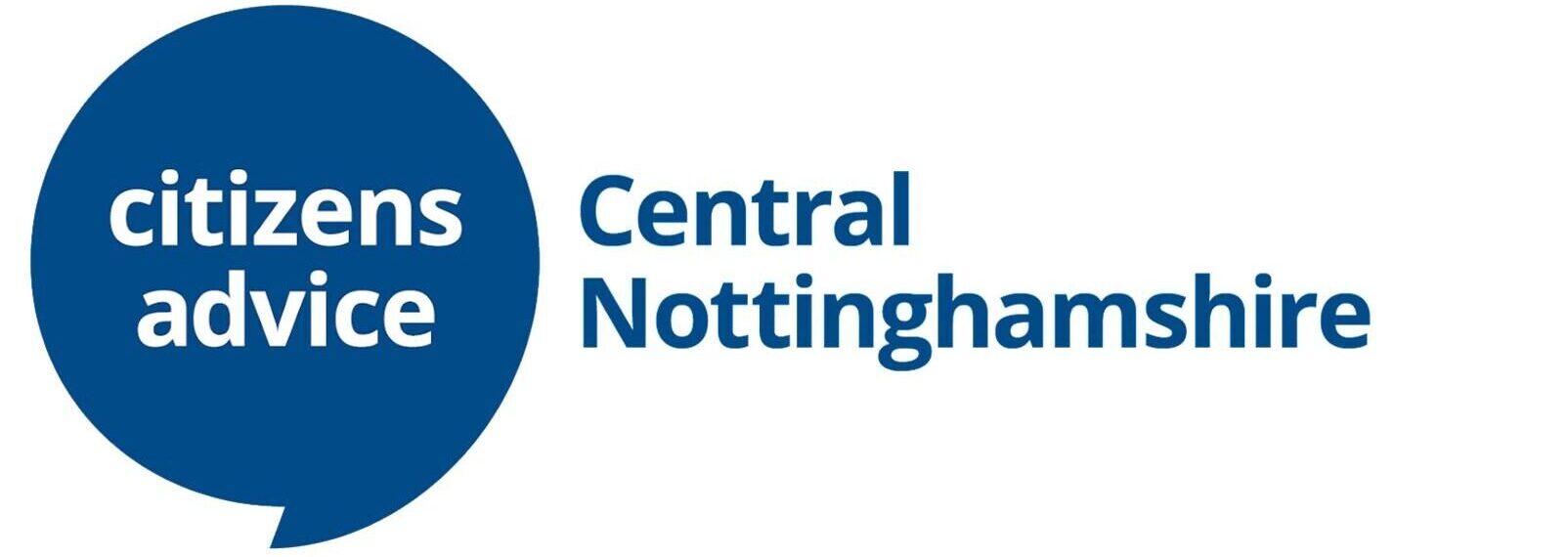- Project summary

This report relates to the final project year that ran from 1st July 2023 to 30th June 2024. The project ran for three years across Nottinghamshire. Changing Lives was established after a pilot project in Broxtowe and thanks to a Partnerships Grant from National Lottery Community Fund was expanded to cover the whole of Nottinghamshire. It was developed as a response to high levels of poor mental health amongst clients. Additionally, a service evaluation showed 18% of Citizens Advice clients were at risk of repeat crisis due to severe and multiple disadvantages. The grant’s objectives are set out below:
Primary beneficiary outcomes
- Better equipped to be able to identify and manage problems through increased
mental resilience.
- Increased confidence to access help and support when it is needed
- Reduced isolation and loneliness
- Increased development of new skills
- Increased optimism about the future
Additional outcomes
- An embedded outcomes-based approach to community advice work for those most vulnerable repeating clients.
- Released capacity for CA’s core and specialist services
- Reduced pressure on other service providers
and
A cemented joined-up approach across all Nottinghamshire’s Citizens Advice services
In order to achieve these outcomes the service design included:
- Delivery a proactive (early intervention) approach to community advice work
- Provide an outcomes-based approach to community advice work that helps people fulfil their potential and equality of outcome
- Gives beneficiaries the skills they need to improve their wellbeing and live more sustainable lives.
Each beneficiary is supported with an action plan that includes:
- Addressing the immediate crisis and advice need.
- Referral to a specialist caseworker when required and liaising with the caseworker
- Referral to a Nottinghamshire Mind Recovery Coach to improve mental resilience where appropriate
- Engagement with additional community and statutory services that would be of benefit
- Scheduled contacts and mentoring
- Targeted exit date

The project has now been encompassed into a coordinated response for the services most vulnerable clients require. This includes those who experience severe and multiple disadvantages and households who experience financial exclusion. The later project, Financial Resilience was modelled on learning from Changing Lives and adopts the proactive advice model and action planning specific to improved financial resilience. One of our proudest achievements has been the ability to replicate and develop the model of working to meet emerging challenges like the cost-of-living crisis.
The result of our test and learn process has led to a consistently delivered outcomes based approach to advice work that is now provided in the Nottinghamshire Districts of Ashfield, Broxtowe and Newark & Sherwood. A seamless pathway for residents to access advice and other forms of support at the correct level to meet their needs.
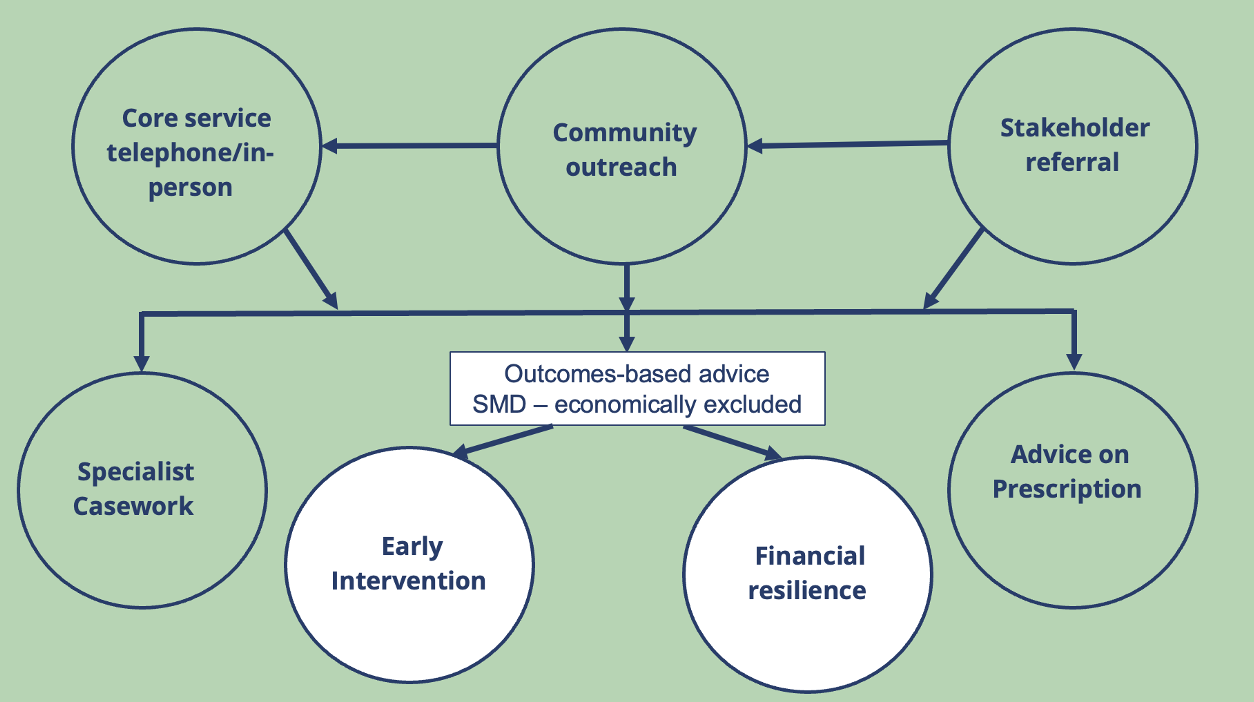
Referrals to Mind Nottinghamshire – Clients were referred to the Nottinghamshire Mind Recovery Coach when their mental health was a barrier to sustain the advice outcomes and remaining out of crisis. They benefited from over 100 sessions per year delivered by Nottinghamshire Mind . The most common reasons are listed below but it is worth noting that a number of clients presented with more than one mental health problem. A few had no formal diagnosis but felt they would benefit from the support of the Recovery Coach. The reasons for referral are illustrated below:
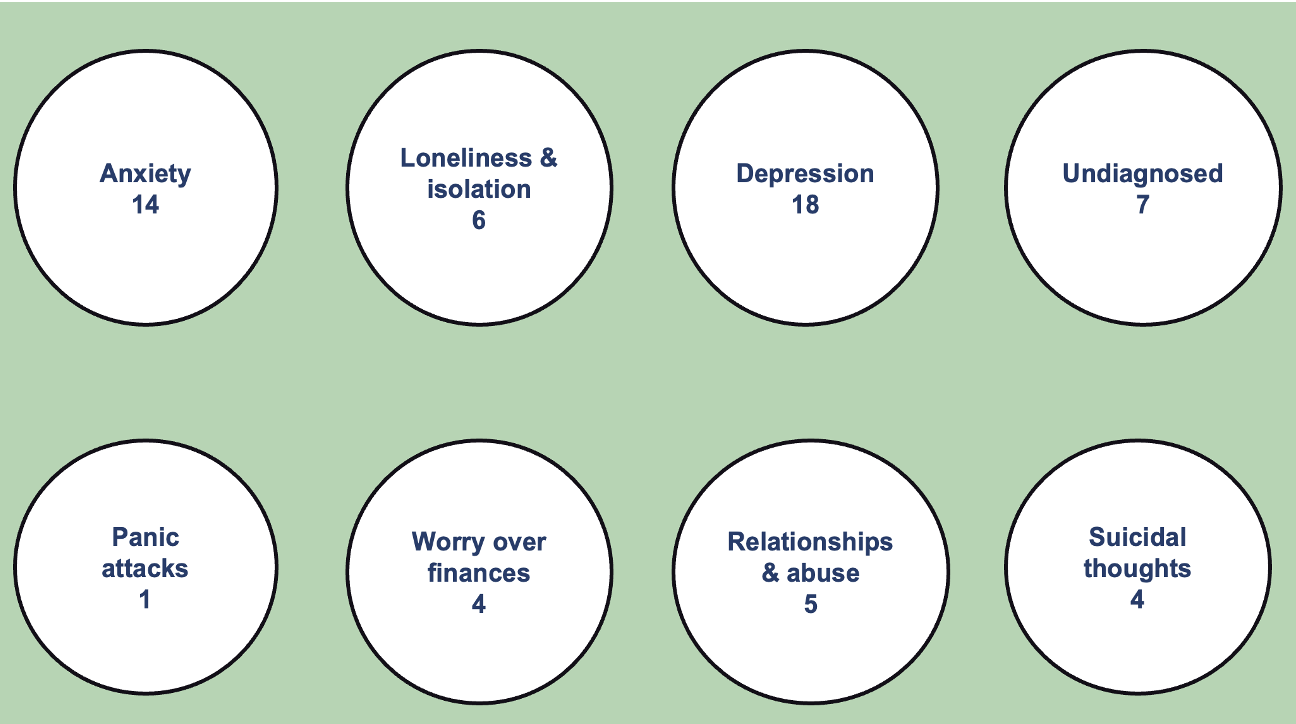
- Client outcomes
The client survey was organised through a centrally held spreadsheet of clients who gave permission to receive a call-back to complete the survey with an independently trained evaluator to ensure consistency of the questions. Changing Lives clients were encouraged to complete the survey over the past year.
During the course of the project our Citizens Panel advised us that the skills question was often misunderstood by clients and so we incorporated this measure into our new financial resilience questions reported below.
Each respondent was asked five questions that were broken down into three advice outcomes and two well-being outcomes. They were asked to score each response based on a sliding scale ranging from -5, the service has made their ability in that respect much worse to +5, the service has greatly improved their abilities and feelings. The average score was then converted into a percentage of improvement. The questions were those approved by the Citizens Panel as being a reasonable outcome to achieve from the project’s activities. Each survey was carried out between one and three months from the initial Client Action Plan.
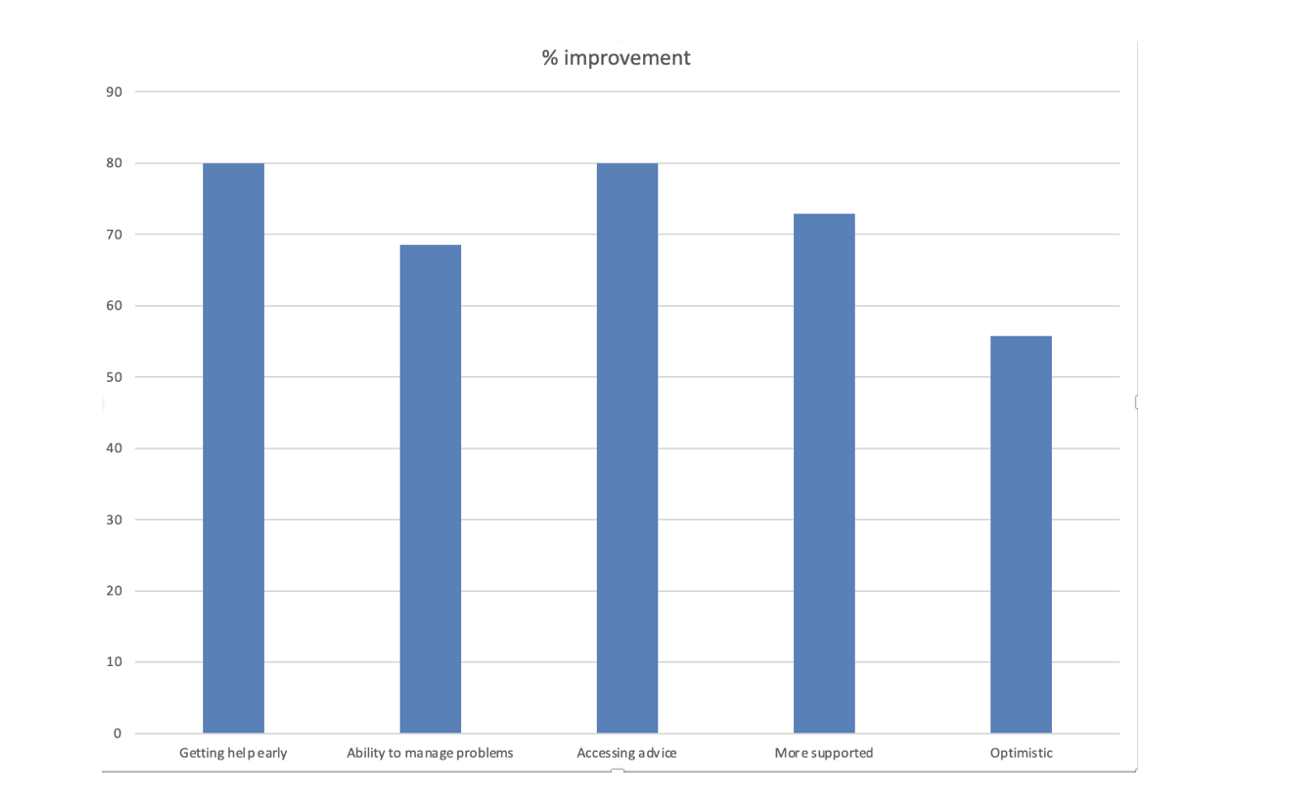
Advice Outcomes – The survey results provide evidence to suggest that, having benefited from the work of the Changing Lives project clients are better able to manage the problems they face in the future with a measured 68% improvement. Beneficiaries also report that they are better able to access help in the future when they need it, 80% improvement. Most importantly, there is a significant improvement in clients knowing when to ask for help early, before a crisis emerges, 80% improvement. This is the most important factor. Promoting an understanding of early intervention to manage the problems our clients face is good for them and also more cost effective for the stakeholders that support them.
Well-being Outcomes – We were also interested to know how the project had impacted on beneficiary wellbeing. The Citizens Panel settled on two questions of wellbeing. Clients told us that they felt significantly more supported and less isolated, an average improvement of 73% is a valuable outcome in itself. There was also a very positive increase in feelings of optimism, 50%. This was down on last year and is likely to be due to the cost-of-living crisis that has presented significant additional challenges for all our clients but in particular those who experience the greatest disadvantage. We feel that a combination of better management of problems, improved financial security (as described below) and direct support with mental health provided by Nottinghamshire Mind results in increased wellbeing but also the client’s ability to navigate the challenges they face and sustain outcomes.
Financial Resilience Outcomes – The project secured £634,094 of additional income for beneficiaries during Year 3. This included increased welfare benefits payments, one-off hardship grants, reimbursements for goods and services and compensation claims.
In response to the cost-of-living crisis we now ask clients a series of questions about their financial resilience. Almost 43% of clients said their income had increased as a result of the advice they received (it is in fact much higher), importantly there was a significant increase in the feeling of housing security for 28% of the respondents. The third highest reported reason for improved financial resilience was having debts written off (21%) with 14% reporting that debt repayments had been reduced. We work hard to reduce household expenditure with things like the Severn Trent Big Difference scheme and ensuring our clients take advantage of social tariffs on things like broadband and other communications.
We routinely provide financial capability mentoring to ensure that clients understand how interest payments are calculated and they are better able to manage their budgets and utilise price comparison sites to avoid high costs for things like utility bills and insurance.
In terms of increased skills, we therefore conclude that the project has helped its beneficiaries to better manage the household budget and tenancy and the Early Intervention Workers are working alongside Financial Resilience Workers to increase participants economic activity by offering referrals to our employment and skills partner Futures. It’s worth noting that Futures now offer in-house appointments at Citizens Advice Ashfield and Broxtowe.
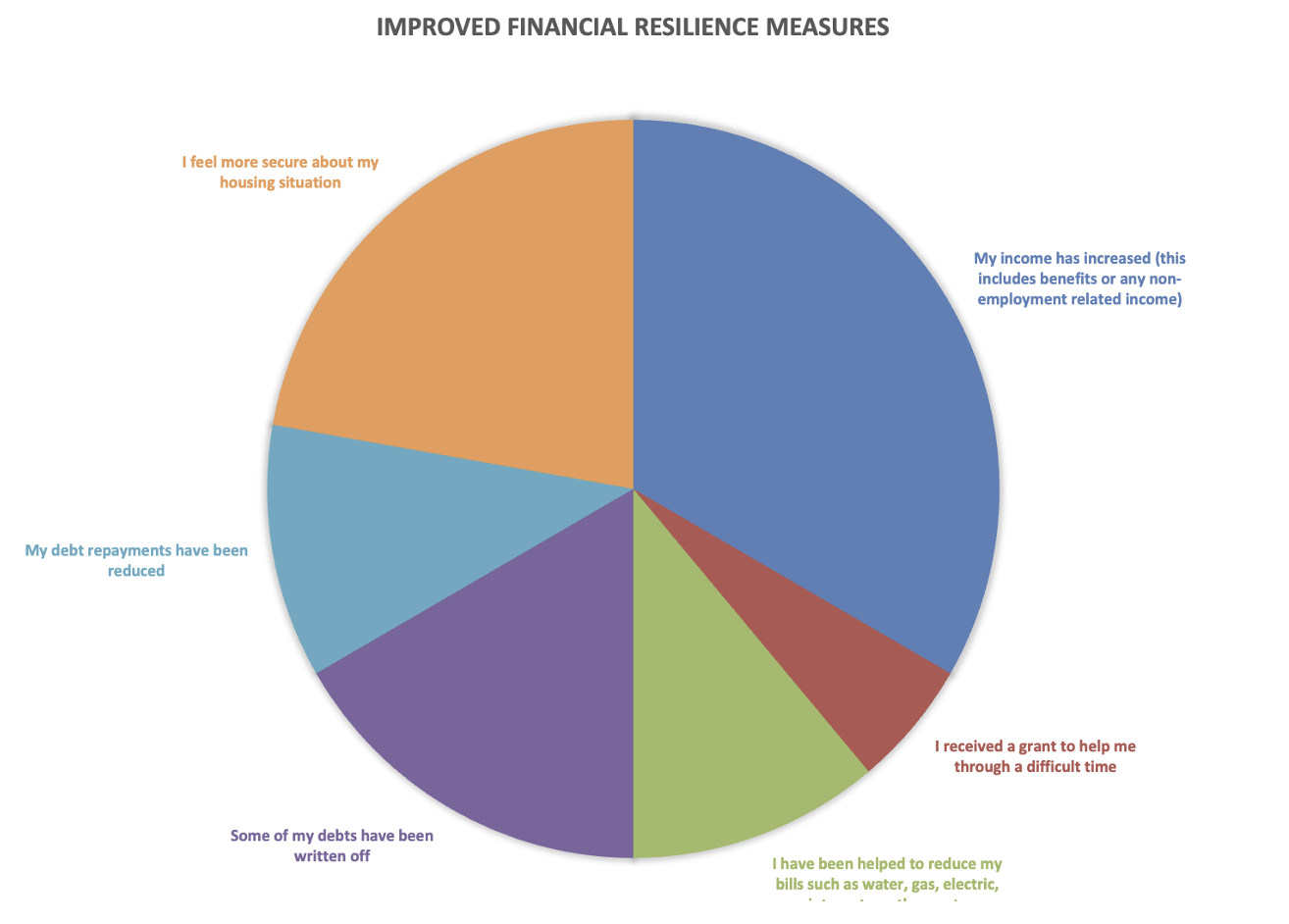
Client comments – We allowed free space in the survey for clients to comment on their experience, including things that were not covered by the questions. They told us:
“What an amazing service.”
[Named EIWs] have been tremendous, everything is perfect!”
“I can’t thank you enough, you have eased my anxiety.”
“The EIW (named) was really helpful and she has had a weight lifted of her mind.”
[Named EIW] has been absolutely brilliant, can’t thank CAB enough.
[Named EIW] has been wonderful. I don’t know what I would have done without her support.”
- Case study
In order to bring the data to life we have chosen a case study that highlights the problems our clients face and the transformation that the project has provided.
Case study Janet (name changed)

Janet who is of state pension age attended the office as she had been widowed within the last 6 months and was struggling to cope. We could see that she would benefit from a referral to the Early Intervention Worker (EIW) because of ongoing support needs. Her challenges were multiple and complex. She had never dealt with money or accounts, her husband had control of all finances. All of the utility bills were in her husband’s name. The client has cognitive issues and memory problems. She becomes easily confused.
The EIW completed full benefits review to establish her income situation and assisted her with a claim for benefits. The client had an insurance policy payment that was due to her. We held a joint call with the client and the company, the claim was completed and the money was sent to her account.
Janet’s financial capability was supported in a number of ways. This has led to significantly reducing her household expenditure.
She had a joint bank account with her late husband. The EIW communicated with the bank on the client’s behalf and sent in a copy of the death certificate. The client’s situation was discussed with the bank who put extra support in place. Janet now has control of her money and has a specified worker at the bank to offer support if she needs it.
Janet’s husband had a full and expensive package with Virgin Media that she would not need and could no longer afford. The account was changed to her name and the basic package is now in place making a significant saving each month.
We contacted the energy provider and transferred the account into the client’s name. An alternative (cheaper) plan was negotiated. The client has been assisted to successfully apply for the (Severn Trent) Big Difference water scheme discount.
Janet has now been supported to organise her bills and finances. She is better able to deal with her own accounts and her income has increased.
The client was also referred to a bereavement group to ease isolation and gain support through her grief. We have made a safeguarding referral as the client discussed issues relating to her safety when around family members.
We continue to support the client along with the Mind Recovery Coach. We are pleased to report that her confidence and independence to manage her own situation has increased through referral to the Early Intervention Worker.
- Stakeholder survey
Developing an outcomes-based approach to advice work has changed the way in which Citizens Advice services interact with stakeholders. It has also led to a change in the way new projects are designed and evaluated, providing evidence of how outcomes-based advice work can contribute to the shared strategic objectives of other organisations and helping reduce pressure on other local services by keeping people out of crisis. Future proofing clients significantly reduces their need for support from local government, NHS, DWP and voluntary services.
The last stakeholder survey focused on key partners in local government, health and voluntary organisations with whom we work closely. This report has come a little early to include the results of the 2024 stakeholder survey but we will include this in our next report for the Advice for Outcomes project funded by Reaching Communities.
After a number of years, the outcomes approach is ingrained within the service as a whole so its seamless approach is cross cutting. Both the Early Intervention and Financial Resilience Workers provide a comprehensive service to our most marginalised clients.
There were 17 respondents to the stakeholder survey 2023 who were representative of the sectors the project has engaged with.
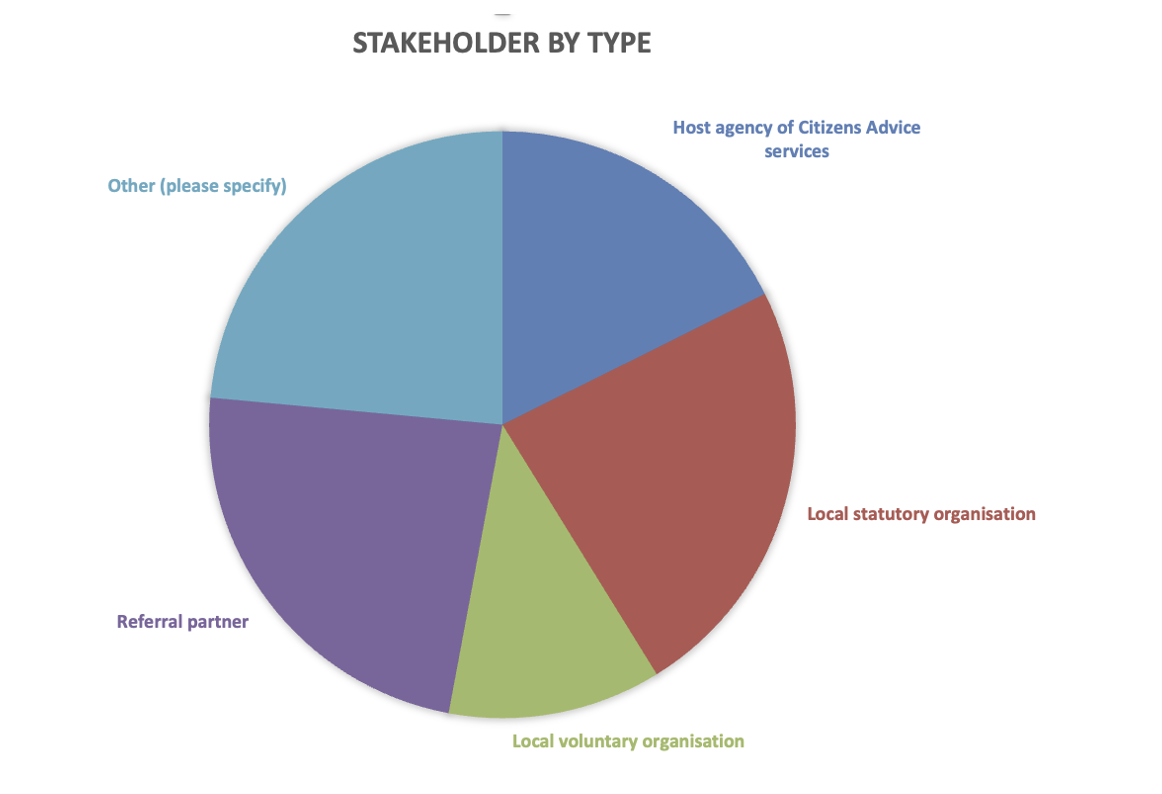
Over 76% of the respondents felt that the work of Citizens Advice now supports their own strategic goals. The principle of outcomes based advice has been taken up by stakeholders with new partnerships with Change Grow Live and NHS Investing in Communities. These projects apply the same working principles but to a targeted population. It demonstrates that key stakeholders understand and value our methodology.
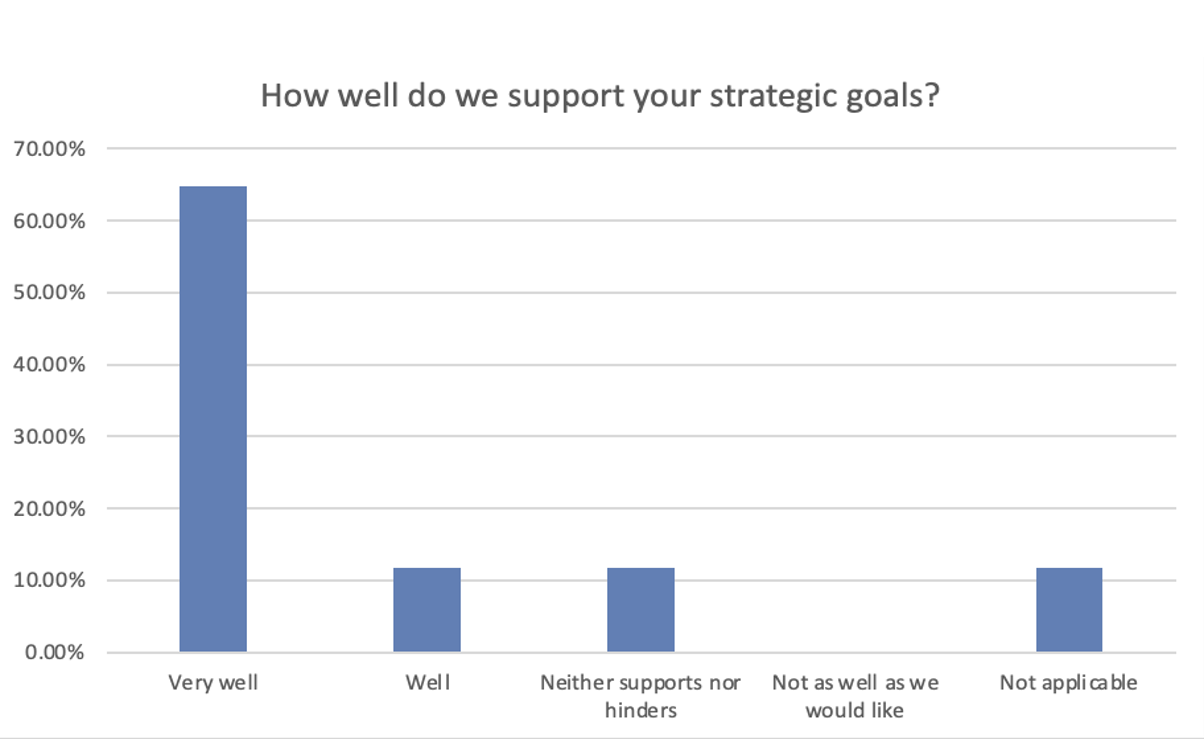
Stakeholders told us:
“We value the partnership and strategic approach, the honesty and willingness at all levels and the clarity of support.”
“I feel that collectively we make a difference to people’s lives.”
One Social Prescribing Link worker told us:
The communication and attitude is amazing, I can never fault the team I now work alongside. They are always willing to listen and go the extra mile for patients.”
One of our Early Intervention Workers told us:
“This year has shown great improvements of communication between organisations.”
We are currently undertaking a new stakeholder survey and will continue to incorporate stakeholder feedback in the development of this and other projects.
- Conclusion
The project set out to help those most at risk of repeat crisis and equal up their advice outcomes. In doing so there were additional benefits forecast for both the organisation and stakeholders. These were:
- Embedded outcomes-based approach to community advice work for the most vulnerable to repeat crises.
- Release capacity of Citizens Advice services
- Reduce pressure on other service providers and the local authority
- A cemented joined-up approach across Nottinghamshire
Evaluation of the project’s success towards these goals finds that the outcomes-based approach, proactively working with clients has been successful. The client survey establishes that both the advice and wellbeing measures adopted demonstrate that beneficiaries of the project self-reported greater improvements in the following:
- Better equipped to be able to identify and manage problems
- Increased confidence and ability to access help and support when needed
- Development of new skills
They also report improved mental resilience expressed as:
- Feeling less isolated and more supported
- Increase optimism about the future
The agreed referral process was successful in reaching the target group with an average problems per client ratio of 12.5. Clients also demonstrated severe and multiple disadvantages (SMD) through health and income inequalities.
The project has released capacity within Citizens Advice services to help more people. Overall total client numbers have increased during the life of the project. In 2023 the majority of this additional capacity has been used to help more people struggling with the cost-of-living.
Through the Financial Resilience work based on the same outcomes advice model, we have forged additional partnerships with Futures and Green Doctor that contribute to system change.
The project has led to new partnerships based on supporting people with SMD including our Change Grow Live Partnership and Investing in Communities (NHS). The outcomes advice model, including early intervention and financial resilience has now been expanded across Central Nottinghamshire to include Ashfield, Broxtowe and Newark & Sherwood.
Whilst the number of clients are small the impact is great. The additional support and action planning to clients who need help to achieve equality of outcome makes a major difference to the overall capacity of the organisation and our stakeholders. We would really struggle to fully support those with severe and multiple disadvantages in Central Nottinghamshire without the Early Intervention Workers.
Neil Clurow
Impact and Evaluation Manager, Citizens Advice Central Nottinghamshire
